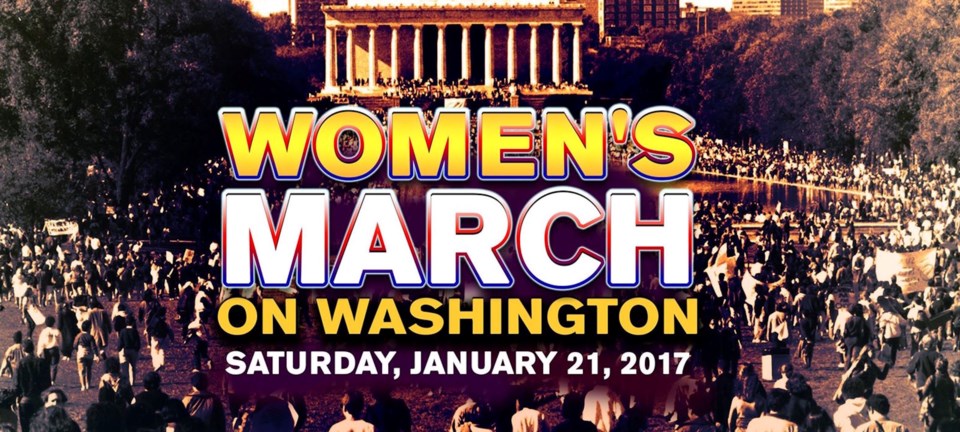When hundreds of buses pour into Washington this week for the Women’s March on Washington, at least four Guelph women will be on one of them.
All are teachers in the city, and all see the protest as a momentous event, one that will show the world that women’s rights, and the rights of minorities are critically important in North America and everywhere.
An incoming president who has shown himself to have misogynistic and discriminatory attitudes won’t stop women from demanding the preservation of human rights, say people like Katie Angus, Barb Omland, and Liz Boyle. They are all taking a bus to Washington, one leaving from Toronto.
Boyle said this week that about 1,200 buses loaded with women are expected to converge on Washington for the Jan. 21 march. Just 200 are booked for the inauguration of president elect Donald Trump, scheduled for the day before the march. As many as 150,000 women are expected to take part in Women’s March on Washington.
Participating women from across North America want to send a message to all levels of government, and to the new administration in Washington, that women will stand in solidarity for the protection of the rights of women, their families, and communities. Hundreds of other communities are holding simultaneous events, including some in Canada.
“I’m just so depressed that Trump has been elected,” said Boyle, speaking of her need to participate in the march. She is active in social justice work in the labour movement, and understands the value and impact of collective action.
“I thought, all I have to do is sign up for the bus, and I can lend my voice to the outcry,” she said. “What Trump stands for terrifies me and I want to be able to show the world that I’m not going to stand by and just let him peel back our human rights.”
Although the US election and the Trump inauguration are events south of the Canadian border, the entire world will feel the impacts of those events, said the Guelph women heading to Washington.
Barb Omland described the march as a grassroots reaction to Trump winning the election. The word spread through social media and grew into a national movement. She initially thought the march was “an American thing,” but soon saw its implications for Canada and the rest of the world.
“Supporting the rights of women and minorities, the people being threatened by Trump’s policies, that’s not an American thing, it’s an international thing,” Omland said. “If we can be a part of supporting that, making that concern more visible to everyone, than I definitely want to be a part of it.”
There is an expectation that the march will be massive, but peaceful.
“We’re not here to throw rocks and bottles, we’re here to peacefully let our concerns be known,” Omland added. “I wouldn’t be a part of it if I didn’t think it would make an impact.”
But protests will have to continue, she added, because people’s memories are short.
“If we can keep it front and center in the public eye, I think that will affect change,” Omland added. “We need to keep vocal about it.”
Katie Angus said taking part in the event feels like being a part of history.
“I think it’s important when you have an opportunity to be a part of something as opposed to being a spectator, to do it,” she said.
A strong display of solidarity in Washington could inspire and embolden young women to dedicate themselves to the preservation of human rights, and not be silent in the face of injustice, she said.
“It’s a pivotal time,” Angus added. “I think people are mad and they want change. It’s an interesting time in history, and I think Trump is part of the flint that is going to set this bomb off. I’m concerned about the future right now.”
Angus said Trump’s victory and his attitudes reflect a level of broad intolerance that is frightening. The time is right to stand up for human rights and justice in counterbalance to what is happening in US politics.
“I’m hoping that it shows the world – the women, men and children of the United States and beyond – that we are not okay with what Trump stands for,” Boyle said.
She added that while the march has broader human rights overtones, the Trump presidency is what motivated it.
“I hope that it empowers people to know that they can speak out,” she added. “I hope it has an impact on all the minorities and the people he is attacking, so that they know they are not alone.”
